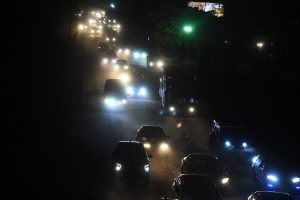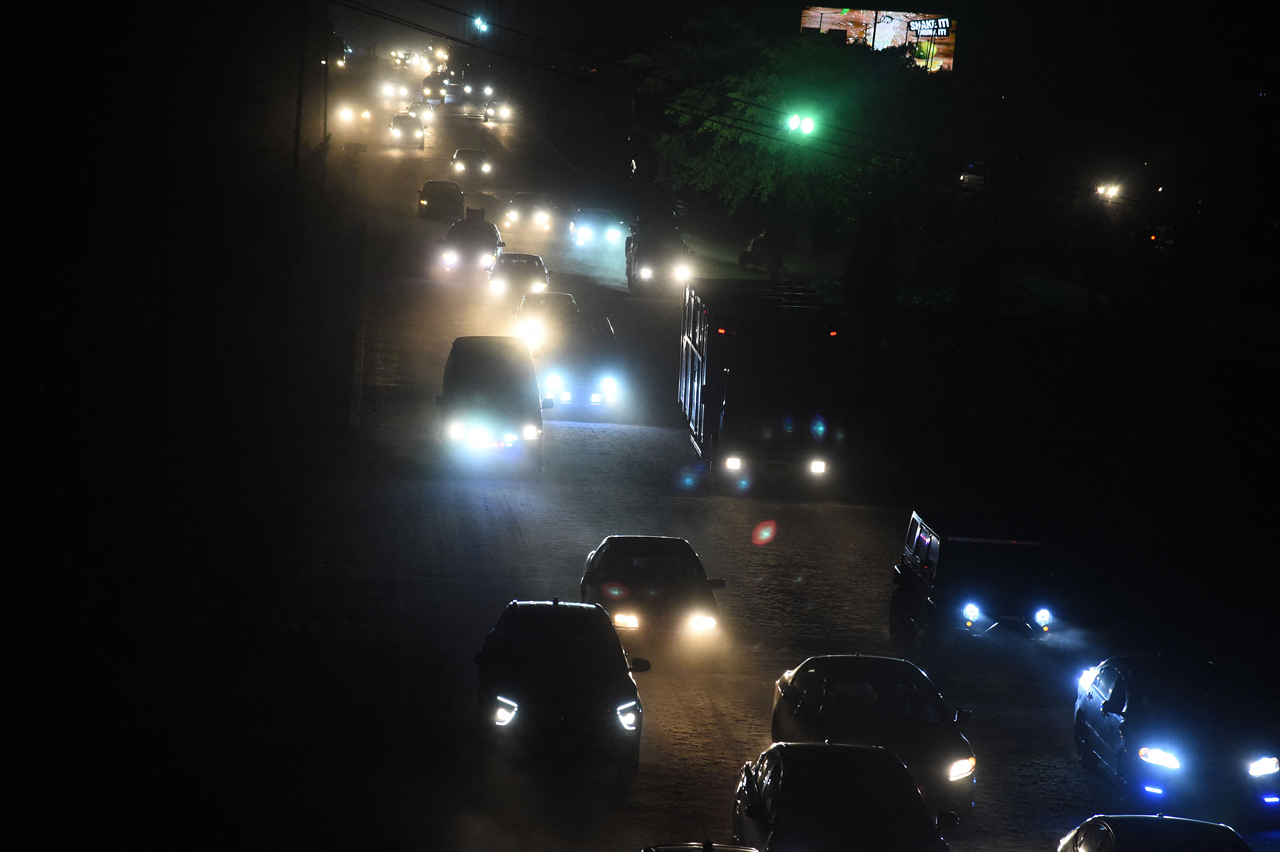In its usual nature, Nigeria’s epileptic electricity grid, yesterday, collapsed, causing blackout and leaving businesses and homes with losses.
Managed by the Transmission Company of Nigeria (TCN), the nation’s electricity grid, located in Osogbo, Osun State, has gone down seven times this year alone.
In a message to customers, major electricity distribution companies (DisCos) said the national grid collapsed at 11:27a.m. The DisCos did not state the cause of the fresh system collapse.
The incident comes 38 days after the national grid suffered a system failure on June 13. The grid has forcefully shutdown for over 140 times since the Federal Government privatised the power sector.
Eko Electricity Distribution Company (EKEDC) had alerted consumers, yesterday, blaming outage on the collapse. The DisCo tweeted: “Dear customers, we regret to inform you of a system collapse on the national grid at precisely 11:27a.m. today, July 20. We are in talks with the Transmission Company of Nigeria to ascertain the cause of the collapse and a possible restoration timeline. We will keep you updated on the situation.”

Kaduna DisCo also noted that while the power failure was regrettable, the company awaits TCN to restore power.
“We sincerely regret the inconveniences caused by the system failure. We hereby assure our esteemed customers of restoration of normal power supply as soon as TCN restores supply to us,” Head, Corporate Communication, Abdulazeez Abdullahi, said in a statement.
At Kano DisCo, Chief Corporate Communications Officer, Ibrahim Sani Shawai, said the collapse caused blackout in the franchise area.
Checks by The Guardian on data released by the National System Operator, a unit under TCN, showed that as at 4:00p.m., only Omoku (45.5MW) and Trans-Amadi (33.40MW) were on the grid as it began a gradual recovery process.
Despite the investment going into improving the grid, World Economic Forum (WEF)’s data that measured grid-related performance under the Energy Architecture Performance Index (EAPI) for 2017, had ranked Nigeria 110th among 127 countries. African countries like Congo, Namibia, Ghana, South Africa, Cameroon, Kenya, Zambia, Botswana, and Sudan were ranked far better, in terms of system performance, than Nigeria.
Association of Nigerian Electricity Distributors (ANED), the umbrella body of DisCos, had decried repeated system collapse, blaming the situation on the obsolete, analog system being used by TCN.
Dr Joy Ogaji, Executive Secretary at the Association of Power Generation Companies (APGC), decried the impact on power infrastructure and the chaos it creates in the form of monetary setback for activities in hospitals, airports and public utilities.
Although Nigeria is currently operating a Service Based Tariff as Nigerian Electricity Regulatory Commission (NERC) had insisted that the electricity market must operate on contract beginning from July 1, the prevailing development has left huge distrust in the electricity market, as most corporate bodies now deploy off-grid solutions, including power-generating sets to escape the impact of persistent failure, especially on critical equipment.
Power sector engineers have called on the Federal Government to declare a state of emergency in Nigerian Electricity Supply Industry (NESI), to enable the mobilisation of resources to tackle the challenges facing the sector and allow capital punishment for those involved in the vandalism of power infrastructure.
Speaking at the International Power Engineering Exhibition and Conference organised by the Nigerian Institute of Power Engineers (NIPE), in Abuja, the Executive Director, Networks, Niger Delta Power Holding Plc (NDPHC), IfeOluwa Oyedele, said such a measure would allow the government to reset the sector.
The conference had the theme: ‘Nigerian Electricity Power Industry in crisis: Separating undue politics from power market.’
Oyedele pointed out that the sector has been running on deficit since it was privatised in 2013 and “is projected to reach over N820 billion deficit this year with cumulative deficit of over N3 trillion since 2014.”
He explained that the collapse of the grid yesterday was just one of the challenges facing the sector, adding that “there are so many causes of grid collapse, some of which is rejection of power by DisCos and vandalism. It is the right time we declared an emergency in the power sector to attack some of these problems.”
Also speaking, the President, Nigerian Institute of Power Engineers, Israel Abraham, urged government to separate undue politics from power market and practice.
He explained that there was too much politics in the sector, which has hindered the full participation of professionals in the sector.
“Political involvement in the power sector has led to huge decay in the sector and this can be seen in the grid collapses and failure to make progress since it was privatized,” he stated.
Meanwhile, the Electricity Bill, 2022, which is poised to open up the space in the power industry to allow states or individuals with capacity to generate their own power and distribute, has been passed by the Senate. The bill’s passage was sequel to the consideration of a report by the Committee on Power.
The bill has now allowed the Federal Government to licence people who intend to operate mini-grid within the state as against the initial situation where electricity was on the concurrent list in the Constitution.
The bill will also give legal backing to renewable energy generation whereby any individual who decides to generate one megawatt of power using solar as energy source is allowed to.
The Senate expressed hope that with the bill, power problem would be solved. “The space is now open. There is little restriction as to who will generate power and distribute.”
Chairman of the Committee, Senator Gabriel Suswam (PDP, Benue), in his presentation, said the bill seeks to, among others, provide an ideal legal and institutional framework to leverage on the modest gains of the privatisation phase of the electricity power sector in Nigeria.
He added that when signed into law, the bill would improve utilisation of generated power through increased investment in new technologies to enhance transmission and distribution of generated power to minimise aggregate value chain loses.
On his part, Senator Ahmad Babba-Kaita (PDP – Katsina), said the faulty way in which DisCos were created was largely responsible for their inability to live up to expectations.
He, therefore, advised the Federal Government to ensure a transparent process in the selection of companies to take-over power generation and distribution across the country.
The Senate President, Ahmad Lawan, in his remarks after the passage of the bill, said “because of its importance and sensitivity, we would like to see a quick concurrence by the House of Representatives, because time is of essence as far as Nigeria is concerned.
“So, we would like to see that this bill is fully processed in the National Assembly and sent to the Executive side of government for consideration for assent by Mr. President. We believe that this piece of legislation can change the fortunes of the electricity industry in Nigeria for the better.”
The Human Rights Writers Association of Nigeria (HURIWA) has admonished President Muhammadu Buhari over concerns about the quality of the legacy he intends to bequeath to Nigeria and Nigerians when he exits office next year.
In a statement yesterday in reaction to the incessant collapse of the grid, National Coordinator of HURIWA, Comrade Emmanuel Onwubiko, said the constant power grid collapse is particularly and spectacularly scandalous.
“The stench of these serial scandals will outlive President Buhari if he does not take remedial measures to correct the man-made scam going on. It is inconceivable that the President will be on record as mentioning so much money that he claims to have sunk into the failed power sector, yet there’s no electricity anywhere in Nigeria.
“So, it is in his self-enlightened interest that he fires the incompetent Minister of Power. This is because we have been experiencing weekly power grid collapse in the last three months since the current minister came on board.”


